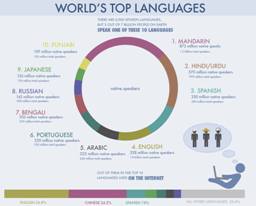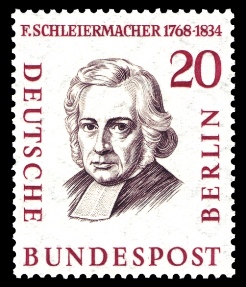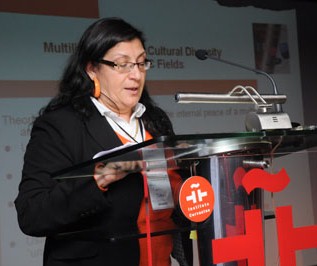Click below icon to Subscribe to Modlingua Channel
Research

-
Hits: 10507

-
Hits: 6313
By Ravi Kumar, Founder, Modlingua Learning, New Delhi
The selected hindi text is part of a short story “Razia’, Maati ki Mooraten –A collection of short stories by written by Ram Briksh Benipuri, during 1941-45. Benipuri was born in the Benipur village of Muzaffarpur district of Bihar. He was freedom fighter and worked closely with Mahatma Gandhi.
He is known for using subject oriented approach. His stories excavate layers after layers of his deep wisdom about people; his close observation of human nature goes beyond superficial evaluation.

-
Hits: 2873
By Afsar Soheila Sattari, Goal- Electronic Print Media & Training Services, Cologne
Note: This paper was presented at International Conference "Role of Translation in National Building and Supra Nationalism" held on December 16-19, 2010 at Instituto Cervantes, New Delhi and forms part of the digital book Theoretical and Empirical approaches to translation, Published by Modlingua, New Delhi
There are persons, social groups and institutions, who clearly defend “naturalism1”, meaning that the human being has a relatively fixed nature and that culture is a phenomenon to ascertain the validity of one way of life. On the contrary, there are others, who defend "culturalism", which asserts a minimal set of social and cultural common features among different people and points out that the leaders and successful individuals of a society should own a pluralist perspective to manage the on-going procedures and emphasize on the necessity of providing a dialogue on cultural differences to guarantee a peaceful co-existence.
“UNESCO published a report2 describing that over 50% of the world’s languages are endangered by the great ones. 96% of the 6000 languages are spoken by only 4% of the population of the world, 90% of the world’s languages are not represented on the internet, one language disappears on average every two weeks and 80% of the African languages have no orthography.” On the other hand, English is spoken by around 500 million speakers throughout the five continents, Spanish is spoken by approximately 400 million speakers in more than 20 countries. Portuguese is spoken by 230 million people in Africa and Europe, as well as French, which is the mother tongue for almost 190000 people worldwide.
The speakers of every one of these languages are scattered in different countries and live in the extremely diverse, multilingual and multicultural societies and have to adopt themselves and co-exist with others. So far, cultural diversity can be an origin of social conflict by remaining unattended. To prevent that, the leaders should try to find solutions to turn racial, religious and tribal differences into strength.

-
Hits: 3386
By Ana Isabel Reguillo Pelayo, Academic Head, Instituto Cervantes, New Delhi
Note: This paper was presented at International Conference "Role of Translation in National Building and Supra Nationalism" held on December 16-19, 2010 at Instituto Cervantes, New Delhi and forms part of the digital book Theoretical and Empirical approaches to translation, Published by Modlingua, New Delhi
AVAILABILITY OF RESOURCES FOR TRANSLATORS AND APPRENTICES AT THE CERVANTES INSTITUTE
In the year 1977 The Cervantes Institute built the reference point of the Spanish Language and Hispanic Culture on their website, the CVC (Centro Virtual Cervantes), the link is http:// cvc.cervantes.es.
Among its many sections, it offers many useful resources to students learning translation and for the professional translators of various European languages. First, I would like to give an overview of the specific sections that help in the learning process of translation and finally, on how the Cervantes Institute in New Delhi within its academic and cultural programs provides a space for learning and practice for those students interested in this new line of work that is in constant demand in India.
One of the objectives and functions of the Cervantes Institute is to disseminate and promote linguistic and cultural diversity of Spanish speaking countries. To be able to accomplish it, the Institute works with many prestigious organizations regional, national and international.
The machine translation (texts or web pages) is available in English, Spanish, French, Portuguese and in the co-official languages of Spain, Catalan and Euskera. This is a service that initially helps users who do not need to master the language and also serves as a good methodological resource for teachers or professionals to learn how to detect errors, false friends, barbarisms, erroneous phrases, incorrect periphrasis, inconsistencies, and so on.
It has to be highlighted that the use of the dictionary and its huge typology (etymologically, ideological, technical, style, data, bilingual, encyclopedic, synonyms and antonyms, Latin and foreign language, grammar and doubt) is one of the areas that should be worked continuously since it is one of the persistent errors in translation students as far as the third year University course, as Ferriz and Sans reflected in their article.





